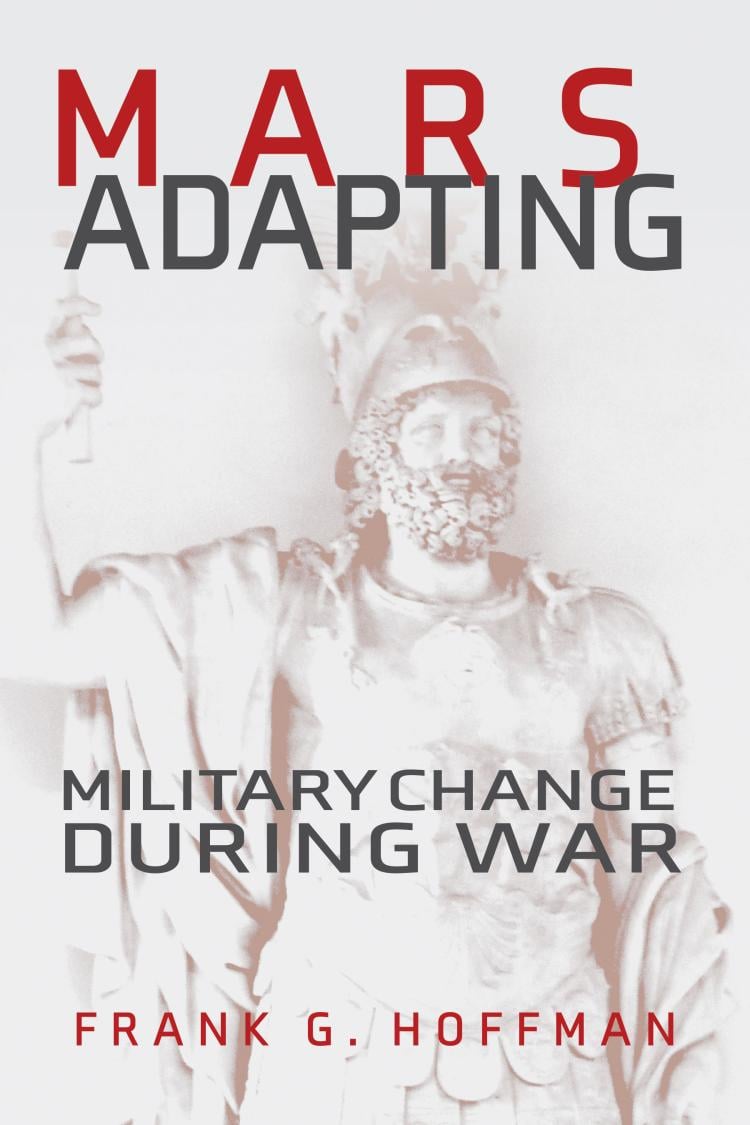Mars Adapting
- Subject: Strategy
- Format:
Hardcover
- Pages:
368pages
- Illustrations:
4 b/w maps, 2 b/w figures, 12 b/w tables
- Published:
March 15, 2021
- ISBN-10:
1682475891
- ISBN-13:
9781682475898
- Product Dimensions:
9 × 6 × 1 in
- Product Weight:
25 oz
Overview
As Clausewitz observed, “In war more than anywhere else, things do not turn out as we expect.” The essence of war is a competitive reciprocal relationship with an adversary. Commanders and institutional leaders must recognize shortfalls and resolve gaps rapidly in the middle of the fog of war. The side that reacts best (and absorbs faster) increases its chances of winning.
Mars Adapting examines what makes some military organizations better at this contest than others. It explores the institutional characteristics or attributes at play in learning quickly. Adaptation requires a dynamic process of acquiring knowledge, the utilization of that knowledge to alter a unit’s skills, and the sharing of that learning to other units to integrate and institutionalize better operational practice. Mars Adapting explores the internal institutional factors that promote and enable military adaptation. It employs four cases, drawing upon one from each of the U.S. armed services. Each case was an extensive campaign, with several cycles of action/counteraction. In each case the military institution entered the war with an existing mental model of the war they expected to fight. For example, the U.S. Navy prepared for decades to defeat the Japanese Imperial Navy and had developed carried-based aviation. Other capabilities, particularly the Fleet submarine, were applied as a major adaptation.
The author establishes a theory called Organizational Learning Capacity that captures the transition of experience and knowledge from individuals into larger and higher levels of each military service through four major steps. The learning/change cycle is influenced, he argues, by four institutional attributes (leadership, organizational culture, learning mechanisms, and dissemination mechanisms). The dynamic interplay of these institutional enablers shaped their ability to perceive and change appropriately.
About the Author
Editorial Reviews
“In this original and important study, Frank Hoffman shows how a military’s ability to adapt under fire is shaped by organisational capacities to learn lessons in war. With fascinating case studies of the U.S. armed services in World War II, Korea, Vietnam, and Iraq, this is an essential read for students of military innovation.” —Theo Farrell, professor and deputy vice-chancellor, University of Wollongong and former head of the Department of War Studies, King's College London
“This work is going to become a classic of use to any of those who are interested in improving the performance of America’s military institutions in war. Frank Hoffman has written an outstanding examination of the problems and issues involved in innovation and adaptation. His case studies come from all four of the U.S. services and provide wonderful insights into the actual difficulties that war presents to learning organizations.” —Williamson Murray, professor emeritus at The Ohio State University
“An excellent work! Hoffman takes a refreshing view that balances military adaptation in wartime with substantial research from the field of organizational learning. This allows Hoffman to provide a new and extremely relevant perspective. Mars Adapting is an important contribution and essential reading for anyone interested in military adaptation.” —Trent Hone, author of Learning War: The Evolution of Fighting Doctrine in the U.S. Navy, 1898-1945 and co-author of Battle Line: The United States Navy, 1919-1939
“A useful addition to professional military education for 21st-century decision-makers at all levels as they prepare their forces to Shape, Deter and Act.” —The Australian Naval Institute
“This new book reveals how the United States military adapted to new and changing conditions during four conflicts, including how the United States conducted its submarine offensive in World War II, how airpower evolved during the Korean War, how the U.S. Army adapted to the conditions of the Vietnam War, and how the U.S. Marine Corps adapted to the fighting in AI Anbar province in Iraq. The author demonstrates how these military forces were compelled to change, and how the need to change can be difficult for the military to perceive and act upon in a timely fashion.” —Military Heritage
“Mars Adapting deserves close scrutiny, and readers will be amply rewarded for doing so…. Mars Adapting is required reading for all scholars and practitioners interested in the questions it raises.” —Parameters
“Mars Adapting is recommended to all those interested in innovation issues and adaptation in armed conflict.” —Politique étrangère
“This is a good book and worth reading. It continues the wider discussion on how militaries can learn rather than finishing [and] has use for both the practitioner and the theoretician.” —The Naval Review
“Mars Adapting is a good primer to explore learning in the U.S. military case studies used. It is most useful to an American military reader given its focus on their armed forces.” —The Wavell Room
“Hoffman’s defense of his theory on adaption during war should be a required study…. The extensive case studies provide a novel insight to U.S. leadership’s decision-making.” —StrategyPage
“Hoffman’s book offers a thought-provoking, cross-disciplinary theory and model for adaptation and innovation in wartime.” — Military History
. . . although Hoffman primarily takes inspiration from previous literature, his ability to integrate different theoretical fields and produce a practical and sound model for a wide array of cases of military change makes this volume a masterpiece. Mars Adapting is a must-read for any military officer. Whether someone is finishing up their education, approaching their assignment, getting a promotion, or simply preparing to lead in combat, any officer needs Frank Hoffman's tools to become a better observer of the battlefield and sponsor of any necessary military change to achieve victory. As Hoffman shows, military change can follow different directions. Yet, the most successful way is to bring the expertise, experience, and ability of the personnel on the ground to the eyes and ears of the top brass in central command. — Journal of Military and Strategic Studies
"Mars Adapting is an ambitious effort to develop a novel and relevant theory for military adaptation. The author goes to great lengths to distinguish his approach from the prevailing views, providing explanations and charts to demonstrate the other qualities each possess... Mars Adapting delivers a new tool to explain which steps organizations use to change." — H-Net









